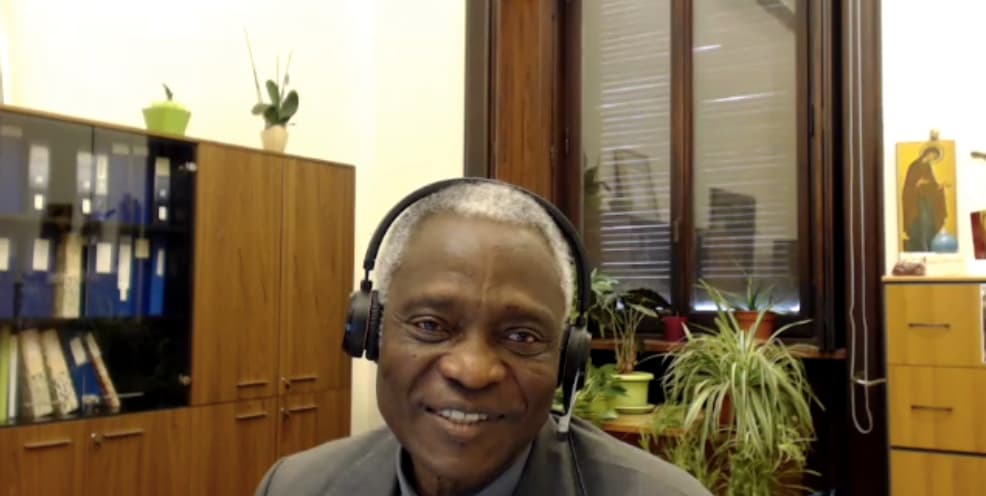When a baby cries, parents leave everything and try to stop their baby from crying: Where is that same urgency when it comes to the cries of the earth and the poor?
That was the challenge posed by Cardinal Peter Turkson to the more than 1,600 registered participants in “Laudato Si’ After Five Years,” an online dialogue on May 29 hosted by the Initiative on Catholic Social Thought and Public Life at Georgetown University in concert with the Vatican’s Dicastery for Promoting Human Development, of which Turkson serves as prefect.
Turkson spoke of an imperative to “pay attention to the earth, pay attention to the poor” and the corresponding need to “try to stop them from crying, try to discover why they’re crying and try to meet their needs.”
The present pandemic, the Ghanaian cardinal continued, has “cost us dearly” — more than 100,000 people have died from the virus in the United States and its disproportionate impact on the poor has been well-documented — and has “taught us a few lessons.”
In parts of India, the cardinal noted, “for the first time you can stand and see the ice and snow on the top of the Himalayas because the atmosphere has cleared up. As we begin to open up again, why should we not do it in such a way that the beauty we’ve gained from this pandemic can be maintained?”
Pointing to the virus’s ability to throw millions of people into unemployment as a clear sign that current systems are not working, Turkson urged attendees to develop new trajectories based on sustainable structures that account for the cries of the poor and the earth.
The cardinal also extended his analysis of these dual cries to the events that were unfolding in Minneapolis in response to George Floyd’s death — where a Minneapolis police officer has since been arrested and charged with third-degree murder. “What is that? It’s just a cry for people to recognize that every human being requires a certain minimum of social conditions to enable him to live and live successfully and happily,” he said.
Dan Misleh, founder and director of the Catholic Climate Covenant, joined Turkson in calling for an increased sense of urgency during the event.
“We need to step it up, just like we have with the pandemic,” he argued in reference to the implementation of Laudato Si’ in the United States. “I worry sometimes that ideology and apathy, including in our own church sometimes, have slowed the efforts that we need to address the climate crisis.”
Noting that Laudato Si’ describes care for creation as essential to a life of virtue, Misleh referred to the climate crisis as a “slow-moving pandemic” that is “hitting the poor the first and the hardest.”
He also pointed to several positive developments marking the five-year period since the encyclical’s publication. More than 500 parishes in the United States have formed creation care teams, a fivefold increase since 2015, and several dioceses have taken significant steps to implement Laudato Si’, with Misleh citing Stockton, Atlanta, Cincinnati, San Diego, and Columbus as exemplars.
Kim Wasserman, executive director of Little Village Environmental Justice Organization in Chicago, told attendees that the encyclical has played a significant role in her community’s battles over poor air quality, first with two coal power plants and more recently with the corporation that plans to transform one of those plants into a major warehousing facility.
“For us as a community, particularly a community that’s very much a Catholic community, when the encyclical came out, we were very surprised — I think for me — to hear folks in the ‘hood talking about the encyclical saying, ‘Wow, things we’ve said, things we believe in, are being lifted up here’,” said Wasserman.
“It’s been a very exciting time for us to lift up the encyclical and really be able to talk about the fact that we’re not the only ones, that there is an entire community of folks out there who truly believe in the same things we believe in, and we believe we have a right to say what happens in our community, and a right to fight for what we should and shouldn’t have in our community,” she added.
Looking ahead, panelists named concrete action steps for Catholics to take in order to further root Laudato Si’s message of integral ecology in U.S. soil.
Misleh encouraged people to get outside to a place where there’s some nature, where they can see the diversity of life that’s in danger if the climate crisis isn’t addressed. He urged attendees to drive to the nearest power plant or landfill and take stock of who lives around them, noting that it is the poorest of communities that reside in these places with significant health hazards.
Acknowledging that it can be difficult to know where to begin, Christiana Zenner, associate professor of theology, science, and ethics at Fordham University, said that simply trying to trace where one’s water comes from can be a powerful step in the right direction because “water often leads us to other types of challenges and problems.”
Turkson encouraged people to remember that “the word ecology is not something academic, far-removed from us.” Rather, it is vital that people come to realize that “all contribute and create this environment, making it good and positive or making it bad and negative, and recognizing this, we’d all appreciate how we can all play a part, a role, in maintaining and building up a healthy environment, because that’s what we all need to thrive and be prosperous in what we do,” he said.















